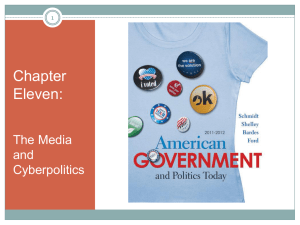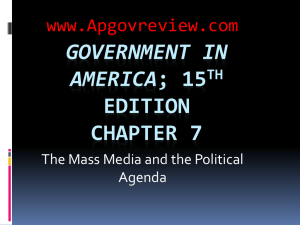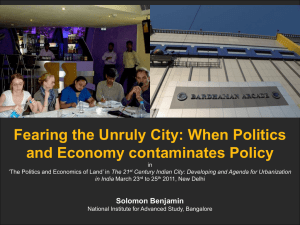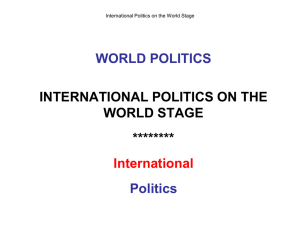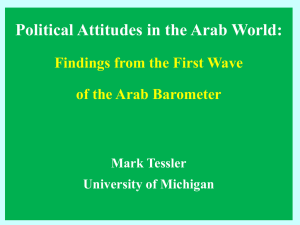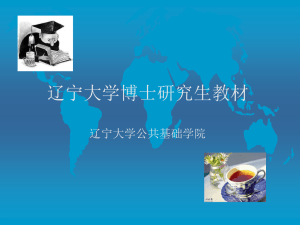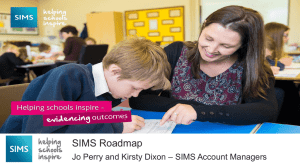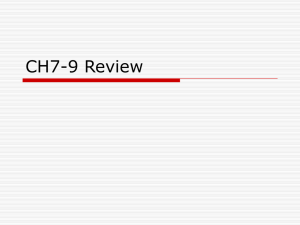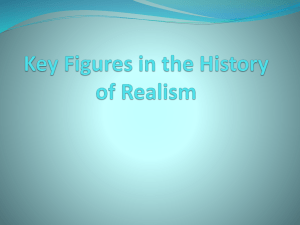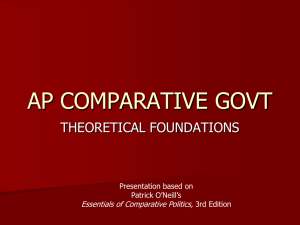Chapter 6 - Convergent Media, Divergent Voices
advertisement
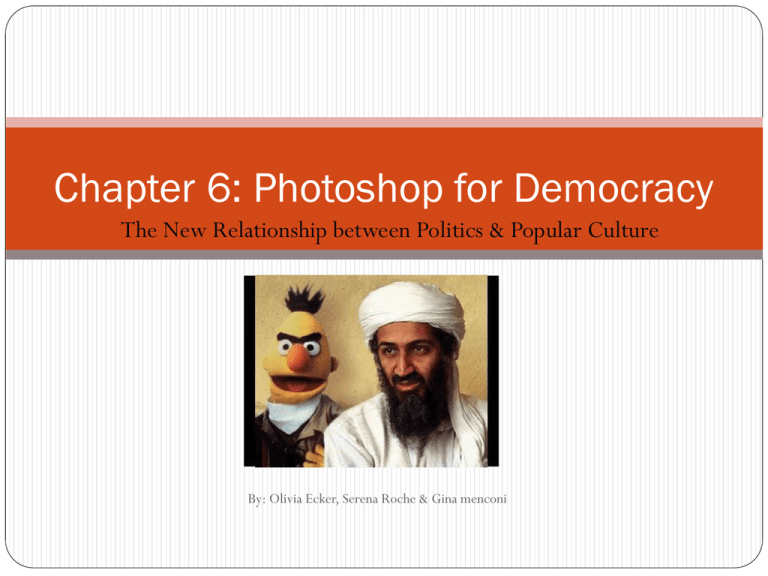
Chapter 6: Photoshop for Democracy The New Relationship between Politics & Popular Culture By: Olivia Ecker, Serena Roche & Gina menconi Introduction Spring 2004, short edited video was produced from footage from News Cast & Donald Trumps hit show “The Apprentice” (2004) circulating the internet. The video is designed by True Majority, a liberal advocacy group in the United States, as a mock interview for The Apprentice & George Bush assigned the tasks as a president. http://www.youtube.com/watch?v=5fKPKhXFxs4 Ben Cohen (Ben and Jerry’s ice cream), True Majority Action founder, says, “its goal was to increase voter participation in the 2004 election and to rally behind the progressive agenda.” In order for True Majority to get their ideas into circulation, they needed to: - Create images that are vivid, memorable, and evocative. - Content has to be consistent with what people know more or less about the world. Through this, sending the information and seeking out to people who participate, could be the start towards a political action. The use of popular culture is taking a shift in the publics role in the political process: using everyday experiences of citizens; to help change the way people think about their community and power, so they are able to mobilize collective intelligence to transform their government. http://www.youtube.com/watch?v=wKsoXHYICqU Crush on Obama Girl, whose video made her an internet sensation gave a boost to the youth on Obama. “Popular culture influenced the way that campaigns courted their voters – more importantly it shaped the public processed and acted upon a political discourse” (Jenkins 219). Some satirical images of Obama “The Revolution Will Not Be Televised” This chapter based off of a song, called the Revolution will not be televised by Gil Scot Heron. http://www.youtube.com/watch?v=BS3QOtbW4m0 The use of the new digital media like the internet has given way to politics. - The 2004, election have use the insurgence of the new digital media to change the nature of their campaign. “Empowerment age” – When challenge Citizens challenge the power of entrenched institutions: “If the information is power, then this new technology – which is the first to evenly distribute information – is really distributing power. The power is shifting from institutions that have always been run top down, hording information at the top, telling us how to run our lives, to a new paradigm of power that is democratically distributed and shared by us,” celebrates Trippi. The New political culture reflects two media system: - Broadcast and commercial: mainstream monitors the channel and looking for content to co-opt and circulate. - Narrowcast and Grassroots: grassroots depend on shared frame of reference created by traditional intermediaries, like the “Trump Fires Bush” example earlier. More than ever politics has become a convergence culture: - candidates can now build a base on the internet, so the public can have the right to participate in the access of information given, as well as the need for TV to win the election. “Cultural Jamming” – A political tactic that reflected the logic of the digital revolution and blogging seems illustrative of a convergence culture. Blogging is a form of grassroots convergence: -It Pools and taps information by using grassroots expertise -Debating evidence and examining all the available information -Most powerfully, challenges one another's assumption. Blogging has changed the dynamics of society: - in traditional news and public opinion - in campaign finance reform has helped to shift the control of candidate and parties into independent action groups. (ex) The Huffington Post http://www.huffingtonpost.com/ http://www.observer.com/2010/media/huffington-postgrabs-peter-goodman-new-york-times# “Fans, Consumers, Citizens” •See the way the campaigns were learning from the fan culture in order to broaden the participation within that campaign - Meetup.org - Moveon.org - “Bush in 30 Seconds” http://www.moveon.org/bushin30seconds/ “Use grassroot media to mobilize and mainstream media to publicize.” Project Greenlight – Convergence politics •Contest run by Matt Damon and Ben Affleck to encourage film makers to make a independent film regarding political activism - CBS wouldn’t air the commercials because they were “too controversial” - They wouldn't give any air time to special interest groups Prehistory •Many of these bloggers have a lot of opposition to the mainstream media - As well as to opposition to what they see as corporately controlled •Give the ability to fans to be able to connect online Photoshop • Have the ability to manipulate pictures to make a political statement •These images represent a lot to young Americans - Freakingnews.com - Fark.com “Photoshop for Democracy” •Argue that these images are bad substitution to the more traditional ways we get are information •However, no matter how the information is presented (campaign brochure) the conversation will still be started •This allows amateurs to get their images across to a much larger audience “Entertaining the Monitorial Citizen” •More and more young Americans are getting their information from entertainment sources •Pew Foundation - 2000 – 39% got campaign information from newscasts - 2004 – 23% got campaign information from newscast •Fond that people who were getting their information from such sources were much less informed about what was going on in the world The Informed Citizen •This notion came about when it became available for citizens to be able to follow debates •The idea of the “digital revolution” now allows citizens to be able to known everything there is to known about politics and past politicians - It is not possible for people to be able to know everything The Monitorial Citizen •These citizens have more information then those in the past but it is argued that they may no all know what to do with that information •As seen in this book, many people are learning how to share, deploy, trust, evaluate, contest and act upon their knowledge in their everyday lives - Should do this in regards to the parody news shows and this will lead to more participation in democratic decision making “Playing Politics in Alphaville” Factors Discouraging Children & Young People from Consuming News •Children find the language of politics unfamiliar •Find politics uninvolving compared to the immediacy offered by popular entertainment •News presents the world as hermetically sealed from their everyday lives •Children and youth feel powerless in their everyday lives •Have difficulty imagining how they might exert power in a politically meaningful fashion •Not allowed to vote •Not defined as political subjects •Do not feel addressed by the news •Want to see change in the process by which they are socialized into citizenship Sims Online: Video Games Combine With Politics •People are allowed to play with power on a micro level •Social contract between participants and a sense that their actions have consequences within the community •Active role to play where individual voices matter •Asked to think through complex ethical issues •Invested in their characters and their communities Sims Online: What Developers Never Expected To Happen •Organized crime would run rampant •Community leaders would rally against con artists and prostitutes •Imaginary elections would devolve into mudslinging and manipulation Sims Online: The Presidential Election Held In Virtual Game •Mr. President would run again Ashley Richardson in virtual presidential election •Virtual presidential election attracted national and international media attention •NPR hosted a debate between the candidates •Alphaville Herald began, small town newspaper serving the needs of community Sims Online: Important Political Issues Emerge Through Game •World of the game vs. world beyond the game •Represented different perspectives on what would be best for community •Choice of leaders would affect the way players experience game world •Candidate Idea: information booths to education citizens about scammers •Some players 5 years too young to vote in actual elections •“Age card” •Power in virtual world, little power in everyday life •Players have impact in their community •Exert leadership •Influence the actions of online worlds •Real power to make change Sims Online: Critique of Online Communities • Adults still prefer engagement in actual communities •Involvement in actions that involve real world consequences •“They don’t matter because they are not face to face” Sims Online: Online Election Relates to Presidential Election • Debate over voters: doesn’t specify who is eligible to vote •Question of earning the right to vote vs. open voting for everyone •“Nothing is ever just a game. Games have consequences. Games also give us an opportunity to break out of the roles and actions that we might be forced into in real life. I decided to take advantage of that opportunity. I freed my game.” •Online election compared to Bush-Cheney vs. Al Gore: The “Stolen Election” •American Democracy even feels broken in virtual world •Alphaville Herald Editor, Ludlow, expelled from newspaper due to creating a commercial game generated only protest -creates question of free speech in a corporate-controlled environment Sims Online: Why “Gamers” Participate in Virtual Communities • People make passionate, but short term investments •Share own beliefs and desires •“Play” with citizenship and democracy •Product thought experiment •Discuss different perspectives and experiences •Worked together to perfect governing mechanisms of communities •Understand and protect their values •Voices as citizens •Encourage youth to think more deeply about social policy •Encourage reflection •Connect issues experienced in play to everyday lives Sims Online: Why “Gamers” Participate in Virtual Communities •Become more engaged in local and national elections •Knowledge culture is to learn how to fix things that are broken •Indentify problems and pose solutions Sims Online: Political Issues Discussed in Virtual Communities •Unmasking a global terrorist network •Puzzle-solving skills to track down terrorists after September 11, 2001 •Identify corruption and waste in U.S. Federal Government spending •Focus is on “rational” solutions to complex policy issues “Vote Naked” Where did “Vote Naked” begin and what does it mean? •Advertisement for the Webby Awards •Feminine bare feet with a blurry bed in the background •Slogan was “Vote Naked” •Suggested that “the computer now allows us to conduct the most public actions within the privacy of our own home in whatever state of dress or undress we desire.” •“Imagine a time when we are as comfortable in our roles as citizens as we are within our own skins, when politics may be a familiar, everyday, and intimate aspect of our daily lives much the way popular culture is today. We watch television in our underwear; we dress up to vote.” •“Vote Naked” could also mean that politics makes us feel raw, exposed, and vulnerable Questions: Politics vs. Popular Culture Today •What would it take for us to respond to the political world in the same way as we respond to popular culture? •How do we break through the sense of distance and alienation many Americans feel toward the political process? •How do we generate the same level of emotional energy challenging the current Powers That Be in Washington that fans routinely direct against the Powers That Be in Hollywood? •When will we be able to participate within the democratic process with the same ease that we have come to participate in the imaginary realms constructed through popular culture? Mobilizing Popular Culture in 2004 Presidential Election to Encourage Voter Awareness and Voter Participation •Technologies and techniques •Fan communities •Concerts, performances •Films •Photoshop parodies •Built games: imaginary communities that govern themselves •Television shows including “The Apprentice” Connecting Because of Political vs. Separating Due to Politics •Heal rift that separates Red America from Blue America •Politics makes it harder for people to communicate with their families, neighborhoods, schools, churches, and workplaces •Attack Politics make people defend their political choices and some people even become unwilling to share political views to maintain relationships Polarizing Debates •Slavery and reconstruction •New Deal •Great Depression •Civil Rights Movement •Vietnam War Non-Polarizing Debates •Gulf War •Economic Policies •Cultural Values Knowledge Cultures •Create quality and diverse information people can access •Learn by sharing insights •Sharing beliefs •Enhance democracy and global understanding •Model new protocols •Consequences of technological change •Experimentation and conscious effort •Core principals to define interactions with each other Questions to Think About… •Do you feel that organizations that use everyday experiences of people to relate into politics will them get involved to transform their government? •What do you think is the best way to empower people? •Does making politics into a kind of popular culture allow consumers to apply fan expertise to their civic responsibilities? •Do you think that the youth of American today has the ability to separate what is fact and what is fantasy from shows such as The Daily Show? •Are you a part of any virtual communities that effect politics similar to the way The Sims Online did to presidential elections? If so, which ones and why? •Do you agree with the slogan “Voted Naked?” Why or why not?

